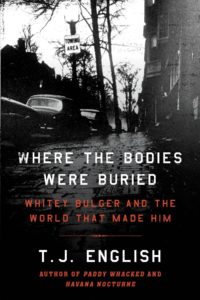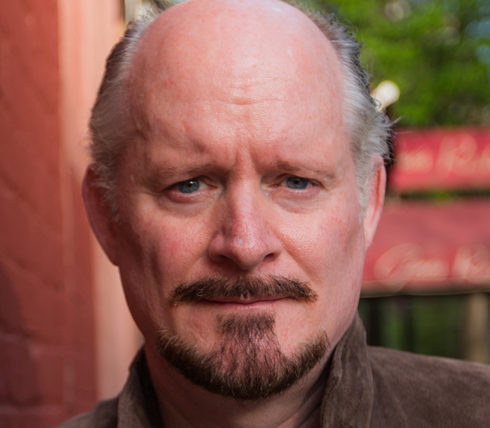T.J. English is a noted journalist, screenwriter, and author of the New York Times bestsellers Havana Nocturne, Paddy Whacked, The Savage City, The Westies, and Born to Kill, which was nominated for an Edgar Award. He has written for Vanity Fair, Esquire, and Playboy, among other publications. His screenwriting credits include episodes for the television crime dramas NYPD Blue and Homicide, for which he was awarded the Humanitas Prize.
In his first book, The Westies, English explored New York’s first Irish mob and its leader, Mickey Featherstone. He followed up with Paddy Whacked, which covered nearly two centuries of Irish-American gangs operating in the underbelly of America’s most dangerous cities – including New York, Boston, New Orleans, Chicago, Kansas City, and Cleveland. And now in Where the Bodies Were Buried: Whitey Bulger and the World that Made Him he brings us the story of the most infamous Irish-American gangster of them all. Published on September 15, 2015, just days before the Whitey Bulger movie Black Mass starring Johnny Depp hit theaters, the book presents a rich story that includes interviews with Bulger associates, retired FBI agents, victims and their families and gives the reader a breathtaking look at the government corruption that played a role in enabling one of the most brutal underworld conspiracies in U.S. history.
T.J., who was a valuable member of the team that founded Irish America magazine in 1985, grew up in Tacoma, Washington and lives in New York City. He is also a co-founder of Irish American Writers and Artists.
℘℘℘
What is your current state of mind?
In the daily here-and-now, things are hectic, and the dominant mood is restlessness. With a new book on the verge of publication, after four years of concentrated labor to make it happen, there are heightened expectations and some anxiety. On the other hand, in the larger scheme of things, I am at peace. Getting to make a living by doing the thing that is most satisfying and gratifying is a blessing for which I am thankful on a daily basis.

What is on your bedside table?
The Power of the Dog by Don Winslow. This is an epic novel, published in 1997, about the narco war in Mexico, with a sprawling cast of characters that includes DEA agents, narcos, politicians, gangsters, and prostitutes, etc. I’m reading this in preparation for reading Winslow’s new book, The Cartel, an updated examination of the narco war, which continues to destroy lives and undermine democracy in Mexico with no end in sight.
Your earliest memory?
I must have been around one year old. I’m standing in a crib, with wooden slats that rise above my head. I’m alone in an upstairs room in the house. Big family, parents, nine brothers and sisters, so it’s noisy in the house. I can hear voices from other rooms, maybe the sound of a TV or radio, banging doors. Clearly, I’m not in the womb anymore. I stand there taking it all in, looking at these bars in front of me, and I’m thinking, “I gotta get out of here.”
Did you read a lot as a child?
I did. I still have the copy of what I think is the first book I ever read: King Arthur and His Knights by Maude L. Radford, passed on to me by a great-aunt. I also remember reading Jules Verne (20,000 Leagues Under the Sea), Jack London (The Call of the Wild), and The Three Musketeers. But my favorite early writer, without a doubt, was Mark Twain, particularly The Adventures of Huckleberry Finn.
When did you begin to think of yourself as a writer?
At some point in grade school, writing a short story or an essay and getting positive feedback. And then in high school I began working on a very good school newspaper and was introduced to journalism. Doing this kind of writing got me out of the house and made me feel engaged with the social universe around me. From that point onward, I knew it was what I hoped to do with my life.
What genres do you enjoy reading and which do you avoid?
I am a big reader of social history, what the publishing biz calls “narrative non-fiction.” A well told true story, thoroughly researched and documented, made compelling and entertaining through the use of fictional writing techniques. I’m also drawn to crime fiction, especially the work of masters like Raymond Chandler, Dashiell Hammet, James M. Cain, and Jim Thompson. I read their work as much for the style of the writing as the content of the story.
I stay away from romance novels, sports books, celebrity memoirs, and books by Bill O’Reilly.
Do you have a favorite book of all time?
I feel as though I’ve been greatly influenced by the works of Dostoyevsky, so Crime and Punishment, The Brothers Karamazov, and Notes from Underground all could qualify. Also, The White Album by Joan Didion. And also Fear and Loathing on the Campaign Trial ’72 by Hunter Thompson. And the book that most directly led me to the kind of writing I do, The Executioner’s Song by Norman Mailer. I could go on and on.
All of your books are based on street gangs and real-life criminals. When did you begin to develop an interest in the criminal underworld?
I don’t necessarily think of it as writing about crime; I think of it as writing about how the social universe functions, albeit from a particular point of view. The criminal activity I write about – organized crime – is almost always an extension of some large aspect of the culture – politics, business, neighborhood, ethnicity, or the simple human desire to survive and prosper. I write about criminals and cops, but I don’t see the world in black and white, good and evil. We are all fallen angels. Granted, some people engage in horrible acts, and my books contain violence and depravity that is almost beyond comprehension. And those acts need to be dealt with by the criminal justice system. But as a writer, I try to not be judgmental. I view the underworld and the upperworld as basically flip sides of the same coin.
Name one thing about Whitey Bulger that you discovered that surprised you.
That the story of Whitey Bulger – the scandal of the Bulger years – is only partly about Whitey Bulger. With Where the Bodies Were Buried, I try to move the discussion beyond Whitey Bulger to the universe that created Bulger. How did this happen? How did Bulger ever get into a position of power to wreak havoc all those years? The answer involves a staggering historical continuity of corruption, some of it buried and covered up for generations. We need to move beyond the cult of Bulger and be honest about how he was enabled by a compromised criminal justice system. I hope this book will be part of that process.
If you’re hosting a literary dinner party, who would you invite (dead or alive)?
Fyodor Dostoyevsky, Flannery O’Connor, Norman Mailer, Lillian Hellman, Jack Kerouac, and Nicki Minaj (okay, she’s not a literary figure, but I would want her there).
Do you have a hidden talent?
I am an amateur percussionist – conga drums, bongos, etc. Started playing about twenty years ago. I love music that has heavy rhythm and percussion – African, Afro-Cuban, and American jazz that’s heavy on percussion. The rhythm of the drum is the soul of the universe. The nice thing about drums is that if you have rhythm, you can play. You may start out with a very simple rhythm – 1/2, 1/2 – but if you can hold that rhythm you can play along with the most sophisticated music. And as you practice and get better, developing a facility for playing more complicated patterns, you can elevate your game and your spirit along with it.
Your perfect day?
Mind, body, and spirit. If I get my writing done, maybe go to the gym and have a workout, and then take a long walk along the Hudson River at sunset, that’s a full and complete day.
Your favorite meal?
Paella.
Favorite country you have visited?
You mean besides Ireland? Brazil. Or maybe Cuba. Or maybe Mexico.
Do you have a favorite place in Ireland?
I was once driving through the town of Glencolumbkille, in Donegal, and thought it was possibly the most beautiful place I’d ever encountered. But then I continued on to the coast, to Buncrana, and walked along the beach at sunset. It was almost thirty years ago, but the memory is still fragrant.
What’s next for you?
A book that I wrote called The Savage City is being developed into a 10-hour mini-series for FX television. The book is about a period of hostility between the NYPD and the black liberation movement in the 1960s and early 1970s. I think it’s the most important book I’ve published, and the subject matter is especially relevant today. I will be involved as an executive producer. Also, my book Havana Nocturne, about the era of the Mob in Cuba in the 1950s, has been in development for a while as a feature film, and looks as though it could go into production soon. I won’t be involved in the production, per se, but it will no doubt be an exciting event if and when it happens.
Hero – dead or alive?
I don’t really engage in hero worship, though there are many people who I admire. If forced to single out one person, I would say Rosa Parks. There has been much discussion about finally putting the face of a woman on U.S. currency, and she would get my vote.
Best advice you ever received?
When receiving advice from others, take it with a grain of salt. Better to trust your own instincts, even if you turn out to have been wrong. ♦


“I don’t really engage in hero worship.” Could have fooled me. Read The Westies and you’ll see he was so blinded by hero worship of Mickey Featherstone, he got conned into writing a book that is a joke. I mean it is naive hero worship to an embarrassing extent. Total hero worship. I bet you $50 this guy is a fag.
Hey Tom, I am Kirk Johnson,s younger brother. Is it true that you &Tony Cassino gave him the nickname Stony after Jay Johnstone the ball player. So sorry to hear about Tony,s passing. He was very kind too me when I was young. At St Patrick,s . Love reading your works. Take care my brother.
Curious..my grandparents were PJ and Kate English . I believe our family came from County Mayo. I believe they had 7 children including my father Gerard…the youngest born in 1912. Any family connection?